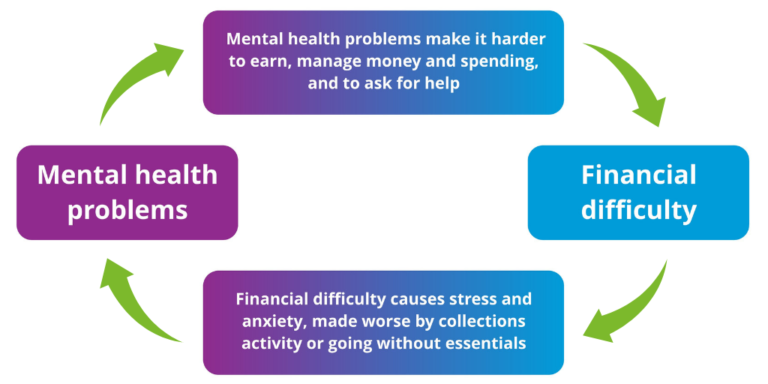
The cycle of mental health stressors and financial burden; image courtesy of Money and Mental Health Policy Institute
by Johana Lozano, Cultural Competency Committee Co-Chair
Finding work is an overwhelming task for anyone. However, it is a distressful journey for individuals who have a behavioral condition and a history of incarceration. Discrimination, stigma, and mental illness caused from being in a correctional institution all contribute to low hiring rates. As a peer specialist at the Peer Resource Center, Laura Kerr uses her lived experience to help citizens of Los Angeles County find meaningful employment. Her group, entitled “Work Readiness,” is more than just a handout. This support group provides career pathways, guidance, and training to improve upon basic job serving skills, understand employer expectations, and learn life skills needed for self-sufficiency.
“There is such a thing as work etiquette that we often don’t know about,” said Kerr.
As part of National Recovery Month, she wanted to emphasize the importance of learning how to earn, manage, and spend money when people have a history of imprisonment. A former participant of her group who is now fully employed at an esteemed entertainment company spoke highly of his experience.
“The group provided a great support system that kept me engaged and accountable. They genuinely cared and knew what I was going though. She checked in to see why I had stopped coming to the group. That was really helpful,” the participant, who wanted to remain anonymous, said. Within one year on the job, the participant was promoted twice and received a bonus at work.
If you would like to learn more about this gathering or want to participate, please contact Laura Kerr at LKerr@dmh.lacounty.gov
Information about the group is listed below:
WORK READINESS GROUP
1 to 3 p.m. on 1st and 3rd Thursdays of the Month (audio only)
+1 323-776-6996
Conference ID: 612 716 535#




